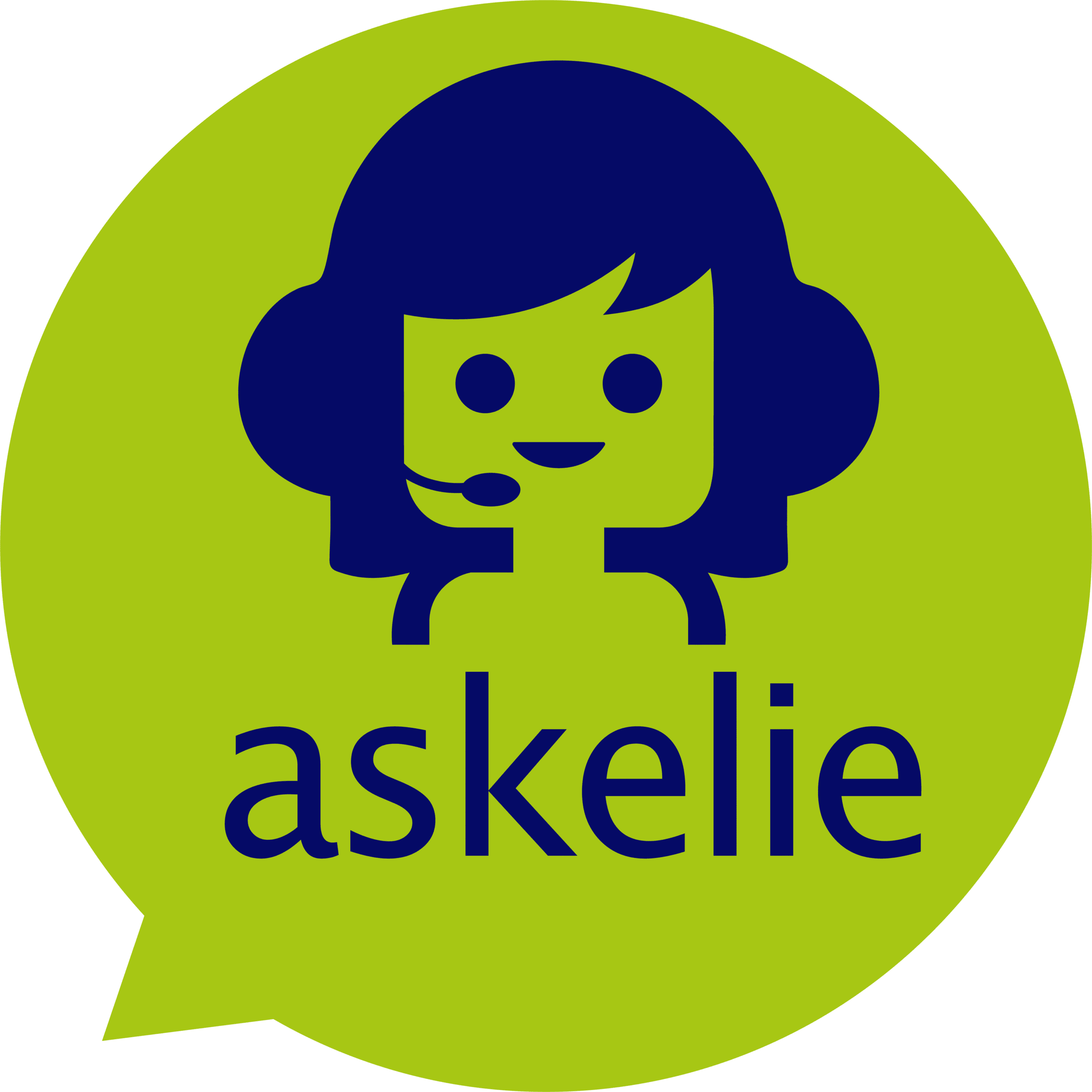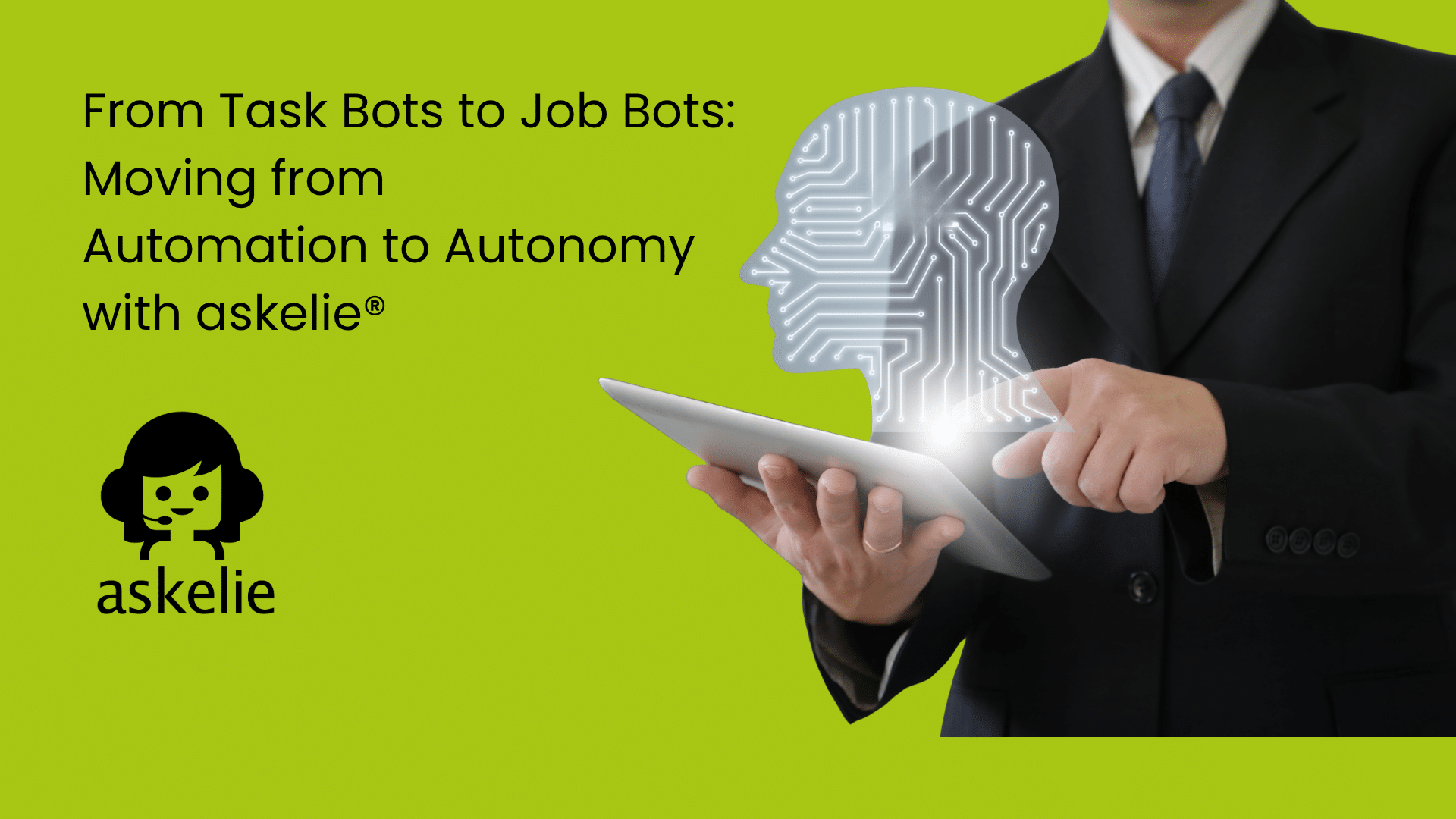Introduction
Across industries, organisations are shifting from simple automation to autonomy. For years, automation meant setting up scripts or bots to handle repetitive, rule-based tasks. That era is over. Businesses now expect intelligent systems that can manage entire workflows, make decisions, and report outcomes with measurable accuracy.
askelie® is built for this next stage. Our platform delivers end-to-end intelligence where every digital worker manages a complete process from request to result. The difference is not just in how work gets done, but how outcomes are tracked, billed, and improved over time. We help organisations move confidently from task automation to full operational autonomy.
The Evolution from Automation to Autonomy
Traditional automation has always focused on efficiency. It reduces manual intervention by following predefined rules. A task bot can extract data, send an email, or copy information between systems. However, it cannot understand intent, adapt to exceptions, or evaluate cost and compliance.
Autonomy changes that completely. Autonomous automation, or agentic AI, introduces reasoning, context, and accountability. It allows systems to understand what needs to be achieved, not just how to execute it. Autonomous agents operate with goals and guardrails, learning from data while staying aligned with business policy.
Moving from automation to autonomy is about teaching machines to manage outcomes rather than actions. Instead of telling a bot to “file this invoice,” the enterprise now instructs it to “complete the invoice process,” which includes validation, approval, billing, and reporting.
Why Businesses Must Accelerate Their Automation to Autonomy Journey
Many organisations remain stuck at the task level because most automation tools were never designed for reasoning or process ownership. They automate clicks, not decisions. As a result, businesses end up with hundreds of disconnected automations that save minutes, not hours.
The real value lies in orchestrating these tasks into end-to-end workflows that can be measured and managed. To achieve that, organisations need systems that:
• Understand business logic and priorities
• Integrate data from multiple systems
• Track SLAs and service delivery
• Report on cost, performance, and compliance
askelie® addresses all four. Our platform builds intelligence around context, not commands, transforming automation into a governed, accountable digital workforce.
How askelie® Bridges the Gap from Automation to Autonomy
The ELIE platform combines workflow orchestration, data reasoning, and secure automation within a single architecture. Our digital workers are not programmed to do one step; they manage the full sequence of tasks and confirm that results meet the defined objectives.
Each agent deployed through askelie® can:
• Understand data inputs and context
• Make conditional decisions based on business logic
• Collaborate with humans when needed
• Record time, cost, and performance metrics
• Automatically raise cross-charges or invoices where appropriate
This combination of intelligence and accountability moves automation from an IT function to a measurable business service.
The Role of Accountability in Autonomous Automation
Autonomous systems can only be trusted if they are accountable. askelie® builds this principle directly into the platform. Every workflow is monitored against service levels, time, and accuracy. Each step is logged, traceable, and auditable.
When a process spans multiple departments, askelie® tracks the effort and applies cost recovery automatically. If one team consumes more automation capacity, the system can generate internal cross-charges or billing reports. This creates full transparency and turns automation into a managed business service with clear financial accountability.
This approach makes autonomy not only operationally effective but also financially visible. It ensures leadership can see exactly how automation supports value creation, compliance, and profitability.
From Single Tasks to Complete Workflows
The difference between automation and autonomy becomes clear when you look at process scope.
A traditional automation bot:
• Extracts data from an email
• Uploads it to a spreadsheet
• Sends a confirmation
An autonomous askelie® agent:
• Reads and classifies the email
• Extracts structured data
• Validates information against business rules
• Flags inconsistencies for human review
• Updates systems of record
• Notifies stakeholders
• Tracks the time taken
• Calculates cost
• Reports SLA compliance
• Raises a cross-charge or invoice if required
The first example completes a task. The second completes a job. That is the askelie® difference.
How askelie® Products Enable Autonomy
intELIEdocs: Automates document reading and classification with contextual understanding. It tracks full document lifecycles, applying cost and SLA reporting automatically.
askVERA: Uses AI reasoning to transform complex text into accessible Easy Read formats. It measures turnaround time and accessibility standards to ensure compliance with regulatory requirements.
askTARA: Continuously monitors supplier compliance and risk exposure. It autonomously flags issues, creates remediation workflows, and records time and cost of resolution.
These modules demonstrate how askelie® delivers not just automation but accountable autonomy. Each agent completes its process, proves its success, and measures its value.
Why Enterprises Choose askelie®
Enterprises are moving toward autonomy because it represents a new standard in productivity. But autonomy without control is risky. askelie® combines both. Our clients gain:
• Transparent governance and measurable outcomes
• Private, secure deployment aligned with ISO 27001
• Human-in-the-loop control for oversight and decision-making
• Real-time SLA tracking and cost visibility
• Automated billing for shared services and cost recovery
With askelie®, organisations know exactly what was done, how long it took, and what it cost. Automation becomes an accountable business asset rather than a technical feature.
The Future of Enterprise Autonomy
Autonomy will define the next generation of digital operations. As businesses rely on intelligent systems for critical workflows, the winners will be those that integrate reasoning, compliance, and accountability from the start.
askelie® continues to lead this transformation by building digital workers that manage entire processes end to end. They think, decide, act, and measure. They ensure that the job is done, that it meets defined SLAs, and that billing reflects true service value.
Conclusion
The journey from automation to autonomy is about more than efficiency; it is about trust, transparency, and measurable outcomes. askelie® delivers intelligent digital workers that not only execute processes but also manage their success from start to finish.
We do not automate tasks; we complete jobs. With SLA tracking, real-time reporting, and automated billing, askelie® turns automation into a governed, value-driven service for the modern enterprise.
Visit askelie.io to learn how autonomous automation can redefine your business operations.


